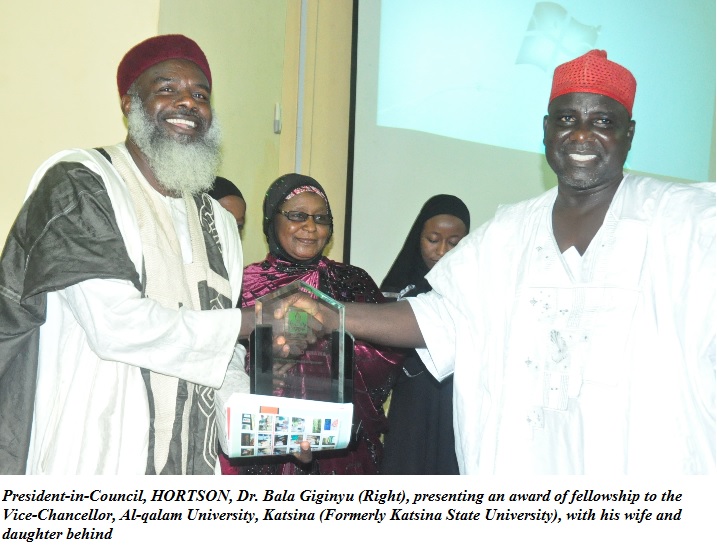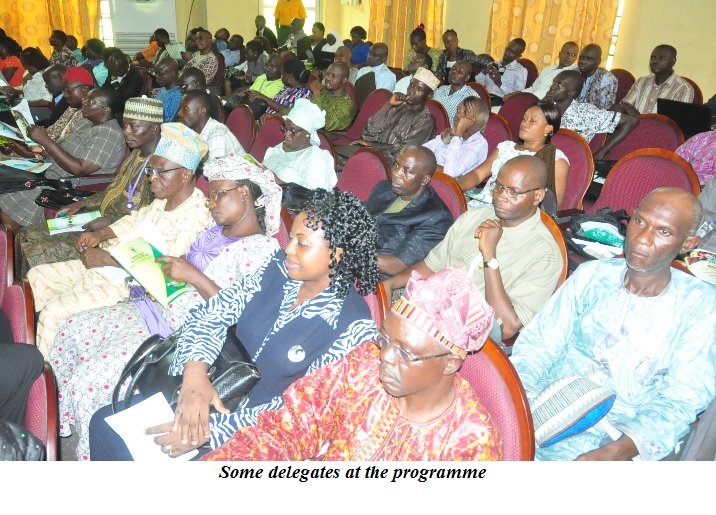It has been observed that the inclusion and adoption of horticulture in agricultural production is capable of transforming the nation’s economy, aid development and improve the livelihood of the citizenry. The President-in-Council (PIC) of the Horticultural Society of Nigeria (HORTSON), Dr. Bala Giginyu, stated this while delivering his address at the 32nd Annual Conference of HORTSON, hosted by FUNAAB.
Dr. Giginyu, who commended the transformation agenda of the Federal Government, called for more awareness on horticulture and other exotic fruits and vegetables, because they performed better during the dry season and were easy to manage for better yield. They also generated more income and possessed great potentials in value chains. According to him, the conference, which had as its theme, “Horticulture For A Healthy and Wealthy Nation”, was expected to lead to sustainable and environmentally-friendly production practices, provide information on horticultural trade, promote export and consumption of fruits, vegetables and spices, particularly, the indigenous ones such as Roselle, Moringa, Telfairia (‘ugu’), ‘ewedu’, shear butter and wild jack-fruit, for improved health of the people and wealth creation for the nation. The HORTSON President added that the conference was expected to focus on important broad areas such as climate change, Agricultural Transformation Agenda, Nigerian industrialisation drive, tourism, food security and farmers’ livelihood and biotechnological applications in horticultural crop protection.
Earlier, the Vice-Chancellor and President, Association of African Universities (AAU), Professor Olusola Oyewole, described horticulture as a potential source of food, livelihood, purification and beautification of the environment. According to him, horticulture was an important branch of agriculture that transcended beyond economic value, as it dealt with the cultivation, processing and merchandising of fruits, vegetables, flowers and ornamentals, which in turn, contributed directly and indirectly to enhanced standard of living for the people and the nation. He said “fruits and vegetables are important for food security and nutrition, while flowers, shade and other ornamental trees are vital for their roles in the provision of medicine and health quality, in beautification, purification and protection of the environment as well as in honey making”. Professor Oyewole challenged stakeholders at the conference, to brainstorm and exchange ideas on how new researches in horticulture that would be of benefit to man and the environment.
Delivering the first keynote address, the Executive Director, National Horticultural Research Institute, Dr. Adenike Olufolaji, lamented that the prevailing food situation in most parts of the world had reached a crisis level. According to her, the Food and Agricultural Organisation (FAO) index of food prices rose by 9 percent in 2006, 23 percent in 2007 and 53 percent in 2008, leaving over 2 billion people worldwide, mostly in Sub-Saharan Africa, undernourished. Dr. Olufolaji disclosed that horticultural crops could play a vital role in solving the global nutrient crisis since crops can be produced across all the agro-ecologies of Nigeria, while recommending that government should cluster small scale farmers, who form a majority of the country’s populace, into groups in every local government and assisting them.
The Executive Director also called for more commitment from the Agricultural Transformation Agenda, in terms of the value chains, to help reduce the incidence of fresh produce post-harvest wastage, as well as raise the economic status and wellbeing of farmers. Corroborating Dr. Olufolaji, the Director, Agriculture and Agro-allied Department, Raw Materials Research and Development Council (RMRDC), Dr. Moyosore Jolaoso, in his keynote address also stressed that horticulture possessed the potential of stimulating economic growth, reducing poverty, enhancing health services, reducing inequity and environmental degradation in the nation. He, however, expressed displeasure over the fact that Nigeria, a producer millions of tonnes of seasonal fresh fruits and vegetables, still incurred very high post-harvest losses largely due to inadequate infrastructure, high cost of transportation, storage and processing, while a lot of resources was spent on the importation of fruits. Dr. Jolaoso called for greater awareness on the importance of the horticultural industry, while advising Nigerians to always ‘eat what they grow and grow what they eat’.
The third keynote address was delivered by Dr. Ibrahim Tudunwada of the National Centre for Remote Sensing, Bayero University, Kano, which focused on the application of remote sensing in horticultural practices. According to him, remote sensing was the science of acquiring information about a target without actually having physical contact with the object. He stated that with remote sensing, images could be used to identify nutrients and water deficiency or surplus, diseases, weed infestations, damages caused by hail, wind and herbicides as well as plant populations through the information gathering, processing and dissemination. He called for the incorporation of the study of remote sensing and Geographical Information System (GIS) technologies into the curricula of colleges and faculties of agriculture in Nigerian Universities.
Highpoint of the conference was the conferment of the Society’s Fellowship on theExecutive Director, National Horticultural Research Institute, Dr. Adenike Olufolaji; the Director, Agriculture and Agro-allied Department, Raw Materials Research and Development Council (RMRDC), Dr. Moyosore Jolaoso; the Vice-Chancellor, Al-qulam University Katsina, formerly Katsina State University, Professor Shehu Garki Ado and the Managing Director, Fumman Agricultural Products Industries Plc. Members were also conducted round FUNAAB’s Songhai-modelled farm and some University Crop Plantations.
